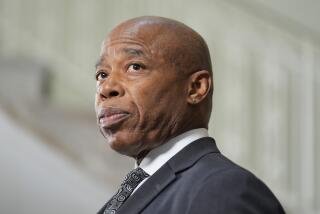Kurdish Mayors’ Job Is a High-Wire Act
- Share via
VIRANSEHIR, Turkey — Being a mayor in southeastern Turkey, where most people are Kurdish, can be tricky. You’ve got to satisfy the voters’ desire to express their ethnic identity more openly, without raising suspicion among Turkish officials that you are encouraging separatism.
Last summer, after two years in office here, Emrullah Cin hit upon what he thought was a safe formula: He organized a festival to celebrate the shelengo, a strain of cucumber that, he claims, grows only in Viransehir and requires no water. Shelengo is the Kurdish word for the vegetable.
“I thought, Kurdish or not, cucumbers were pretty harmless,” Cin recalled with a wry grin during a recent interview.
The Turkish regional governor, however, disagreed. He banned the event, saying it posed a “threat to the indivisible unity of the Turkish state.”
Such are the difficulties facing Cin and 33 other mayors whose election in 1999 gave local political power for the first time to a pro-Kurdish group in Turkey. So far, they have been able to do little to relieve decades of Turkish repression of the Kurdish culture and language. There are an estimated 13 million Kurds in Turkey, constituting 20% of the population.
“We are wearing shirts of fire,” said Cin, a 35-year-old former schoolteacher, using a Turkish metaphor for risky missions.
Many of the Kurdish mayors, all members of the People’s Democracy Party, remain popular. Yet the Turkish government’s treatment of them ranges from the unabashedly discriminatory to the patently absurd. Turkish prosecutors have accused some of the mayors of trying to sow the seeds of an independent Kurdish homeland.
Unlike their counterparts from other political parties, the Kurdish mayors are routinely barred from events organized by Turkish officials and face what Cin calls an undeclared economic embargo by the central government in Ankara.
“Every single project I sought funding for has been rejected,” he said.
With a long history of drought and no local industry, this city of 160,000 people long relied on trade with Iraq. But legal trade ended when the United Nations imposed sanctions on Turkey’s southeastern neighbor following Iraq’s 1990 invasion of Kuwait. Nowadays, the city gets by on a small amount of oil smuggling.
A 15-year-long conflict between Turkish forces and separatist guerrillas of the Kurdistan Workers Party has prompted thousands of people to move to Viransehir from surrounding rural villages, further straining the city’s resources.
When Cin became mayor, he found that the city owed its employees 23 months’ worth of back wages and had an additional $2.5 million in debts. “The [central] government did not lift a finger for us,” he said.
Life could get worse for the Kurdish mayors if Turkey’s constitutional court upholds a demand by the state prosecutor that their party be banned on charges that it acts as the guerrillas’ political wing. Hundreds of the party’s officials have been detained during the last year in violent police raids, and 10 of the mayors face criminal charges as they struggle to run their cities.
Mehmet Yasik, a Kurdish mayor who brokered peace between two feuding Kurdish families in the province of Adana last month, wound up on trial for his efforts, accused of “aiding and abetting terrorists” allegedly involved in the dispute.
The constitutional court is expected to rule on the party’s legality in the coming weeks. A ban would further jeopardize chances of European Union membership for Turkey, which also has balked at an EU demand that it ease restrictions on use of the Kurdish language.
Police have beaten and detained hundreds of university students across Turkey in recent months for signing petitions urging that optional Kurdish-language courses be added to the official school curriculum. Turkish leaders say the campaign is orchestrated by the guerrillas, who have observed a unilateral cease-fire since the capture of their commander, Abdullah Ocalan, in 1999.
Turkish authorities have cast a wide net for Kurdish separatists and hauled in some unlikely suspects. Seven families in the largest Kurdish province, Diyarbakir, face trial on charges of “damaging the national culture” by giving their children Kurdish names such as Berivan, Kurdish for milkmaid, and Baran, which means rain.
This month, Turkish prosecutors charged an elementary school teacher in Diyarbakir, Recep Simsek, with “spreading terrorist propaganda” for putting a Kurdish-language love poem on his wedding invitation. He faces up to five years in prison if convicted.
Cin, in addition to having his festival banned, came under investigation last year because of his city’s new flag. The governor’s office said it was evocative of the red, green and yellow banner of the guerrillas; the inquiry is continuing.
Nevertheless, the city and its mayor appear to be thriving. The municipality’s debts all have been cleared, Cin says, largely because residents who once made a habit of dodging property taxes and utility bills now pay willingly and on time.
The funds have helped build a health clinic for women, where a team of young doctors and nurses is shattering religious and social taboos by teaching mostly illiterate women how to use contraceptives.
“The mayor changed my life,” said Mekiye Bilge, 35, who after her sixth baby decided to ignore pressure from her in-laws and stop bearing children.
Earlier this year, citizens dug deeper into their pockets and raised money for 8,000 new pipes to modernize and expand the city’s sewage system. “There is a huge sense of solidarity here,” the mayor said. “A burning need to show the rest of the country that we can take care of ourselves.”
More to Read
Sign up for Essential California
The most important California stories and recommendations in your inbox every morning.
You may occasionally receive promotional content from the Los Angeles Times.










